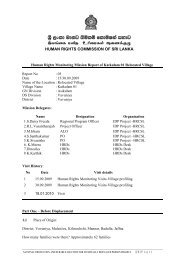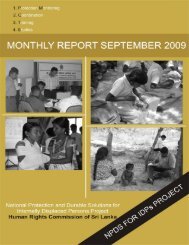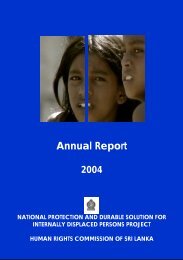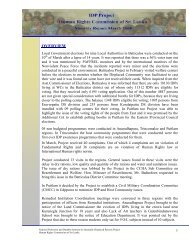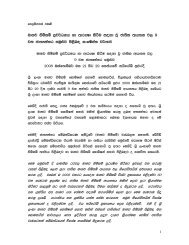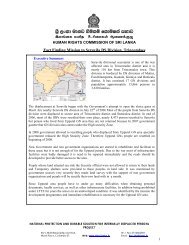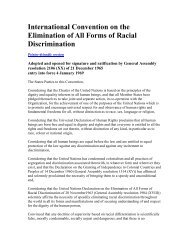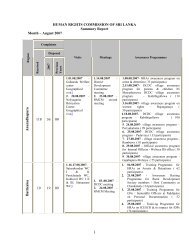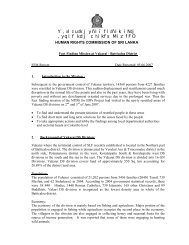Right to Health of Internally Displaced Persons - IDP SriLanka
Right to Health of Internally Displaced Persons - IDP SriLanka
Right to Health of Internally Displaced Persons - IDP SriLanka
You also want an ePaper? Increase the reach of your titles
YUMPU automatically turns print PDFs into web optimized ePapers that Google loves.
3. Safe disposal <strong>of</strong> excreta<br />
Ensure adequate sanitary facilities at all temporary camps for<br />
the displaced. Where necessary, make arrangements <strong>to</strong><br />
construct adequate number <strong>of</strong> temporary latrines according <strong>to</strong><br />
the guidelines.<br />
4. Disposal <strong>of</strong> refuse<br />
Co-ordinate disposal <strong>of</strong> garbage by sanitary burial or burning in<br />
suitable adjacent areas <strong>of</strong> temporary shelters.<br />
Control flies, insects and rodents by proper use <strong>of</strong> physical and<br />
chemical methods (insecticides and TCLpowder).<br />
If garbage is removed daily by the local authorities using<br />
trac<strong>to</strong>rs, ensure enough barrels (garbage bins) are available in<br />
the temporary shelters for collection <strong>of</strong> garbage.<br />
5. Treatment and management <strong>of</strong> minor ailments<br />
Co-ordinate with the local medical institutions/authorities <strong>to</strong><br />
establish mobile medical teams <strong>to</strong> visit temporary shelters for<br />
the displaced daily and provide treatment.<br />
Refer and transport those that require institutional care.<br />
6. Prevention and control <strong>of</strong> potential outbreaks<br />
In a case <strong>of</strong> diarrhoea in particular, prompt action must be taken<br />
<strong>to</strong> ensure early treatment and prevention <strong>of</strong> further spread.<br />
In case <strong>of</strong> contagious diseases such as acute respira<strong>to</strong>ry tract<br />
infections and chickenpox, these cases should be isolated and<br />
referred <strong>to</strong> hospitals if necessary.<br />
Steps should be taken <strong>to</strong> control mosqui<strong>to</strong> breeding <strong>to</strong> prevent<br />
and control mosqui<strong>to</strong> borne diseases such as dengue, malaria<br />
and JE.<br />
7. Disease surveillance<br />
MOH/PHI should visit the camps daily <strong>to</strong> inquire in<strong>to</strong> unusual<br />
occurrence <strong>of</strong> disease events/outbreaks.<br />
Collect and report data related <strong>to</strong> health events in camps<br />
according <strong>to</strong> the format provided by the Epidemiology unit<br />
(annexure).<br />
MOH should consolidate the above data weekly and send a<br />
consolidated report <strong>to</strong> RE with a copy <strong>to</strong> Epidemiology Unit<br />
(annexure).<br />
82



